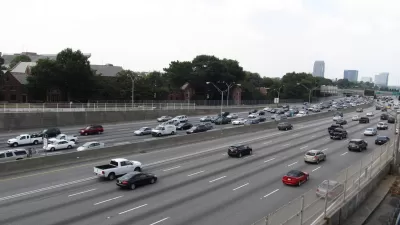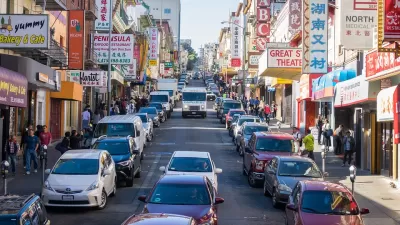The folks over at City Observatory brew up a "Cappuccino Congestion Index" to show that anything can be shown to cost Americans vast sums of money.

In a (partly) tongue-in-cheek analysis, Joe Cortright uses methods to estimate the cost of traffic congestion to examine another economic scourge: waiting in line for coffee. His grievance is clear. "It's annoying to queue up for anything, but traffic congestion has spawned a cottage industry of ginning up reports that transform our annoyance with waiting in lines into an imagined economic calamity."
Cortright writes, "we've applied the 'travel time index' created by the Texas Transportation Institute to measure the economic impact of this delay on American coffee drinkers [...] When you scale these estimates up to reflect the millions of Americans waiting in line for their needed caffeine each day, the total value of time lost to cappuccino congestion costs consumers more than $4 billion annually."
No one, Cortright says, expects Starbucks to scale up enough to eliminate its morning lines. "But strangely, when it comes to highways, we don't recognize the trivially small scale of the expected time savings (a minute or two per person) and we don't consider a kind of careful cost-benefit analysis that would tell us that very few transportation projects actually generate the kinds of sustained travel time savings that would make them economically worthwhile."
FULL STORY: The Cappuccino Congestion Index

Alabama: Trump Terminates Settlements for Black Communities Harmed By Raw Sewage
Trump deemed the landmark civil rights agreement “illegal DEI and environmental justice policy.”

Planetizen Federal Action Tracker
A weekly monitor of how Trump’s orders and actions are impacting planners and planning in America.

Why Should We Subsidize Public Transportation?
Many public transit agencies face financial stress due to rising costs, declining fare revenue, and declining subsidies. Transit advocates must provide a strong business case for increasing public transit funding.

Understanding Road Diets
An explainer from Momentum highlights the advantages of reducing vehicle lanes in favor of more bike, transit, and pedestrian infrastructure.

New California Law Regulates Warehouse Pollution
A new law tightens building and emissions regulations for large distribution warehouses to mitigate air pollution and traffic in surrounding communities.

Phoenix Announces Opening Date for Light Rail Extension
The South Central extension will connect South Phoenix to downtown and other major hubs starting on June 7.
Urban Design for Planners 1: Software Tools
This six-course series explores essential urban design concepts using open source software and equips planners with the tools they need to participate fully in the urban design process.
Planning for Universal Design
Learn the tools for implementing Universal Design in planning regulations.
Caltrans
Smith Gee Studio
Institute for Housing and Urban Development Studies (IHS)
City of Grandview
Harvard GSD Executive Education
Toledo-Lucas County Plan Commissions
Salt Lake City
NYU Wagner Graduate School of Public Service





























